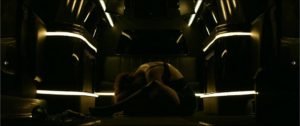The Glass Coffin [Movie Review]
An ominous title like The Glass Coffin portends darkness, and Haritz Zubillaga’s film does not shy away from going to some very dark places. It is the kind of film designed to drive part of its audience to the doors, and I am told some did just that at the screening I attended at the FilmQuest festival (where it won Best Feature). The Glass Coffin is just riveting enough that I failed to notice. While protagonist Amanda initially appears doomed to standard torture porn, Zubillaga manages to strike a balance between exploitation and drama often enough to reward the hardened viewer.

In the film, actress Amanda (Paola Bontempi) is headed to a ceremony where she is to receive an award for an illustrious career. As her husband is delayed returning from a trip, she boards the limousine arriving at her house alone. She is unable to make any contact with the driver, then she slowly realizes that the drive is taking too long. It is perhaps not that surprising when a filtered voice comes over a speaker telling her there is no escape from the vehicle, and she must comply with whatever the voice asks.
 The Glass Coffin is almost entirely confined to the limousine, and this setup is both strength and weakness, as the single, small location concept is more than a little familiar. The demands over the speaker lead Amanda where one might expect, but Zubillaga does show some admirable restraint in depicting the more unpleasant happenings inside the limo, and they are unpleasant indeed. The antagonist is also fairly easy to unmask, although the bizarre showdown in the third act defies convention. Writer Aitor Eneriz and Zubillaga mostly work around the inherent limitations of their scenario, and the director especially is up to the challenge. The limo feels appropriately small, but Zubillaga finds enough interesting places for his camera to keep things moving.
The Glass Coffin is almost entirely confined to the limousine, and this setup is both strength and weakness, as the single, small location concept is more than a little familiar. The demands over the speaker lead Amanda where one might expect, but Zubillaga does show some admirable restraint in depicting the more unpleasant happenings inside the limo, and they are unpleasant indeed. The antagonist is also fairly easy to unmask, although the bizarre showdown in the third act defies convention. Writer Aitor Eneriz and Zubillaga mostly work around the inherent limitations of their scenario, and the director especially is up to the challenge. The limo feels appropriately small, but Zubillaga finds enough interesting places for his camera to keep things moving.
The real star here is Bontempi, and not just because she plays a dual role in a film with a cast that can be counted with a few fingers. Bontempi keeps the film on the rails, even during the out-of-control ending, and alternates between strength and vulnerability both believably and heartbreakingly. Zubillaga marches her into a real war, and she does not hesitate. Her performance as Amanda is key in sharpening the film’s question of how far we would go for personal gain, or revenge.
UGeek Rating: 7/10
Leave a Reply